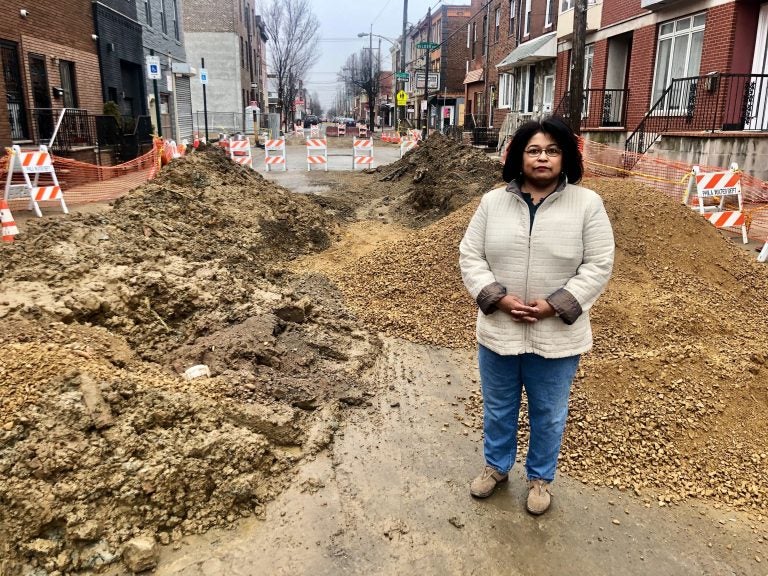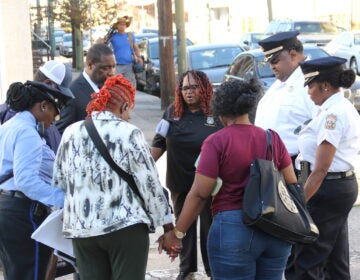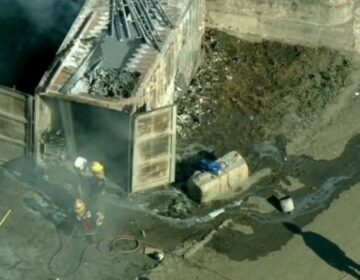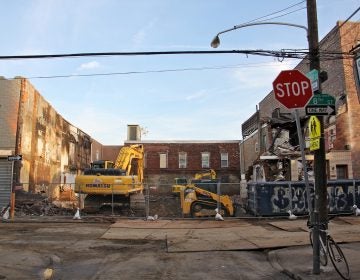South Philly block blasted by deadly explosion still feeling aftershocks
A Philadelphia Water Department main ruptured Thursday on the South Philadelphia block recently shaken by an explosion caused by a crack in a 92-year-old gas main.

Domenica Federico stands near her home on the 1400 block of South 8th Street. (Courtesy of Kara Gaulrapp)
A Philadelphia Water Department main ruptured Thursday on the South Philadelphia block recently shaken by an explosion caused by a crack in a 92-year-old gas main. The Dec. 19, 2019 blast took two lives and destroyed five rowhouses.
Residents of the 1400 block of S. 8th Street were left without water for five hours. The burst was the eighth water-related incident in the six weeks since the explosion, a number both the Water Department and residents find unusually high.
“This is not normal,” said Domenica Federico, a resident of the block. “It was dinner time. I couldn’t wash my dishes. I couldn’t wash my pots and pans.”
Federico moved into her S. 8th Street rowhouse in 1991. She stayed through nearly 30 years of commuting to Bucks County, even as others in her position left for easier commutes and the comforts of the suburbs. But the deadly gas-fed explosion tested her faith in the city she adores, where she has paid taxes her whole working life.
She understands that the city is old and requires costly upkeep — the water main that burst on Thursday dates back to 1859, she said.
“Between the taxes, we pay here and the other revenue we get, I think we should be able to fix our streets,” Federico said.
What really bothers her is the fact that the new homes near her that are selling for $700,000 don’t have to pay the same level of property tax that she does, she said.
“They got new gas mains, new water lines. Everything was nice and tied in real nice to existing pipelines. Everything is new there. And they got a 10-year tax abatement,” Federico said. “They are getting all the perks.”
“Meanwhile, we are residents who pay our taxes every year and its swiss cheese underneath our streets,” Federico added.
On Wednesday, less than 24 hours before the water was turned off on 8th Street, officials from City Council, Philadelphia Gas Works, the Streets and Water Departments, and related agencies met with Federico and her neighbors at the South Philadelphia Older Adult Center on East Passyunk Avenue.
It was the first public meeting to address questions about the city’s plan to fill sinkholes and replace infrastructure damaged by the explosion and fire.
Federico said she sees workers with Philadelphia Gas Works and other city agencies laboring daily and trusts people are doing their best. But, she said, there is an enormous amount of work to be done after a blast she likens to “a small earthquake.”
Taylor Lake, who lives a block south of the explosion, worries that the city’s attempts at repairing the damage may potentially cause another catastrophe.
PGW recently dug up Lake’s sidewalk to check for leaks. Afterward, they replaced the sidewalk with soft asphalt but didn’t put up a barrier to block traffic from driving over it. She fears the weight of the cars could strain gas mains already brittle and vulnerable with old age.
In response to resident concerns, city representatives assured residents that road barricades will be put up and sinkholes inspected. On the whole, however, the agencies emphasized the lack of resources at their disposal.
Manny Rivera lives a block away from the explosion site and he said that on a daily basis, fears another explosion.
“I have a wife that stays at home and works from home. I want to make sure that when I leave my house, that’s not gonna happen, like it happened that day and I got that call,” he said.
He said that the cracks in the street have worsened since the explosion.
“It’s been ridiculous, the cracks that have appeared and have expanded,“ Rivera said.
Sinkholes, sidewalk cracks and temporary asphalt can be warning signs of potential damage to a nearby house’s foundation.
In response to direct questioning, Stephen Gallagher, director of emergency services for the Department of Licenses & Inspections, agreed to prioritize inspecting foundations of homes in the vicinity of the explosion.
L&I will leverage the Office of Emergency Management’s existing response system in order to frontload requests for inspection, according to L&I spokesperson Karen Guss. That communication channel should be open within a few days.
The Pennsylvania Utility Commission — the agency charged with investigating the explosion — did not send any staffers to the meeting.
WHYY is your source for fact-based, in-depth journalism and information. As a nonprofit organization, we rely on financial support from readers like you. Please give today.






